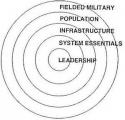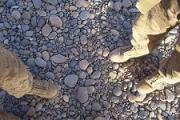Shek and Tom Odom,
"Thanks for the response. As I was checking out the book today, I was having a hard time finding where COL Summers didn't downgrade COIN for US forces. He specifically states that COIN, as an internal problem, should have been assigned to Vietnamese forces. In doing so, I think he portrays that not only should the US not have adopted COIN as a primary mission (although Krepinevich takes this conclusion to task), but that it shouldn't have even been a secondary mission - it should be sourced to local troops."
I stand corrected on this point. My understanding of Summers was based on pages 169-172 of the paperback edition of On Strategy (1982). He does not in fact argue that the US should have done both conventional war and counterinsurgency; he argues that the latter was for the South Vietnamese to do. But his main point was that only if the North was sealed off from the South was counterinsurgency in the South really possible, and that is what I took from his book.
"An officer could take a year of classes at the Army War College/Naval War College/Air War College/etc., and take the exact same classes at a top tier university, and while it may be a wash in terms of the overall quality of faculty and material presented, the experiences will be completely different. Surrounded by fellow military peers at the war colleges, one's views may not be challenged, and drastically different and competing view points may or may not be introduced. However, at a civilian university, the officer will be exposed to many different and varying viewpoints. Furthermore, these conversations will continue outside of the classroom."
I would agree from my experience as a grad student in history at a state university in Texas, where there were a couple of Army captains in my adviser's seminar during my time there. I don't think they took classes in which they would have had to argue with for example post-modernists. But in our seminar they benefited from getting into the subject matter of things like decolonization, getting criticism of their writing, and interacting with the foreign students as well as with us, including outside class. And there were certainly a multitude of views. I should note that the benefit went in both directions too.
Having officers go to civilian universities for master's degrees is good for both civilians and the military, and officers with the ambition and ability should go on for doctorates. I would even have officers serve as visiting faculty to give courses to civilian students on a country or war that they know a lot about. My concern is that more broadly educated officers cannot take the place of civilians who have a better understanding of military affairs and larger strategy. And while it is impressive to have an Army capable of a vigorous internal debate about itself, I hope civilians do not conclude that the difficulties in Iraq and elsewhere have been the result of a purely intra-military set of problems.








 .
.







Bookmarks